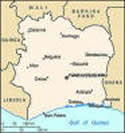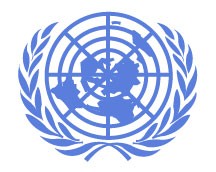Wariness Permeates Ivorian Radio
Michael Hedges September 1, 2004
West Africa holds a wealth of resources. A quarter of a billion people in 15 countries might be enjoying the benefit of colossal oil, mineral and agricultural wealth if not for tribal conflict, superstition and official corruption.
Radio broadcasting in and for West Africa reflects all of this. Generalizations, though,  fall flat: community, national, commercial, state and international broadcasters are active and, at the same time, vulnerable. For the last decade war and conflict have run rampant through the region. African broadcasters have witnessed it all. fall flat: community, national, commercial, state and international broadcasters are active and, at the same time, vulnerable. For the last decade war and conflict have run rampant through the region. African broadcasters have witnessed it all.
As in much of West Africa, radio is the primary medium in Ivory Coast, the world’s largest cocoa producer and recently embroiled in civil war.
“Radio is certainly the most effective medium,“ says Ivory Coast National Press Commission deputy director Francis Domo, “even if television appears more impressive. In the most distant hamlets, in the dense western forests or northern savannas, it is common to see the ear of the most modest citizen stuck to his transistor radio.”
ONUCI FM on the air in Ivory Coast
 UN sponsored radio ONUCI FM opened in mid-August after issues over its mandate were resolved Some Ivory Coast government officials questioned the stations neutrality. State broadcaster RTI “loaned” the station a frequency.
UN sponsored radio ONUCI FM opened in mid-August after issues over its mandate were resolved Some Ivory Coast government officials questioned the stations neutrality. State broadcaster RTI “loaned” the station a frequency.
The chief deputy at the U.N. mission, Alan Doss, explains the importance of launching the new radio.
"Wherever we have these missions now, we've found it necessary to have a U.N. voice." said Doss.
"The U.N. voice will be an independent voice, I hope an objective voice, interested only in the facts. We have only one ambition in Cote d'Ivoire, and that is to help the country return to peace and prosperity."
|
<<La radio en tant que médium est certainement le plus efficace des instruments de diffusion des informations même si la télévision apparaît plus impressionnante. Dans les hameaux les plus éloignés, dans la forêt dense de l’ouest ivoirien ou dans la zone de savanes du nord, il est fréquent de voir l’oreille du citoyen le plus modeste collée à son transistor.>>
“Radio is a form of communication which corresponds well to African civilization,” said Ivorian jurist Koffi Animan Paul at a February seminar for broadcasters sponsored by the German Konrad Adenour Fondation. “Africans prefer radio because all that it teaches them is said and not written…which corresponds to their civilization, not a civilization of writing but spoken language.”
Radio signals easily cover large geographic areas. Battery powered and wind-up receivers make radio more accessible than expensive television in areas with limited flows of electricity. Rural illiteracy limits the impact of printed media.
Most broadcasting in Ivory Coast is through state broadcaster Radiodiffusion Television Ivoirienne. Two national radio channels are offered; Radio Côte d’Ivoire, a general interest channel, and Frequence 2, a music channel.  Two privately owned commercial stations offer music without DJs or news; Radio Nostalgie, affiliated with the French Nostalgie network, and JAM FM, programming rap, funk, R & B and raggae. Two privately owned commercial stations offer music without DJs or news; Radio Nostalgie, affiliated with the French Nostalgie network, and JAM FM, programming rap, funk, R & B and raggae.
Commercial advertising is only allowed on RTI channels and the two national commercial stations leaving local radio operators, according to Francis Domo, dependent on tiny municipal budgets and simple barters. Forty-four local stations – half community and half private - operate throughout the country along with 7 religious and 2 educational stations.
|
With French and United Nations troops attempting to prevent Ivory Coast from slipping back into civil war several media outlets critical of President Laurent Gbagbo were silenced.
Just four years ago Richard Pituwa built a transmitter from left behind electronics. This year One World Broadcasting Trust honored him and his station, Radio Canal Révélation.
Professionals call them complex disasters. Wars, civil and otherwise, have complex roots and complex consequences.
|
Four foreign broadcasters – BBC World Service, Radio France International (RFI), Voice of America (VOA) and Gabon’s Africa #1 transmit from FM frequencies in Adibjan, the large costal city. Rebels in the northern regions have reportedly seized FM transmitters limiting RTI from fully covering the country.
The Minister of Communications ordered RTI in June to clear all news reporting from western Ivory Coast with government censors after supporters of President Laurnet Gbagbo accused new RTI general director Kébé Yacoub of “colluding” with former rebels.
Regimes in less than democratic countries consistently view all media outside their control as threatening, resorting to jamming broadcasts from outside their borders and tightly regulating those within. Independent broadcasters are intimidated, threatened and worse.
Unfortunately, radio broadcasts have also incited violence. The 1994 genocide in Rwanda was incited by the notorious Radio Television des Mille Collines.
UN peacekeepers and international humanitarian agencies recognize radio’s power in Africa and several stations have been launched to encourage civil dialogue and responsible media.
The Ivory Coast government, embroiled in civil war since September 2002, has accused foreign media of pro-rebel bias and recently resisted attempts by the United Nations Mission to operate a radio station in the country.
In May the UN Mission in Ivory Coast notified the State Ministry of Transport that 12 FM frequencies were required under the UN peacekeeping mandate. Named ONUCI FM, the French acronym for the UN Mission, the station began test transmissions on 95.3 FM in Abidjan, the countries largest city, and launched a promotional campaign.
The Ivorian National Audiovisual Communications Council (Conseil national de l’audiovisuel-CNCA) referred to the station’s tests as “pirate radio” and refused as illegal the demand for frequencies. UN Security Council resolution 1528 of 27 February 2004 mandates peacekeepers “…an understanding of the peace process…including establishment of a United Nations radio broadcasting capability.”
The Ivorian government has had a contentious relationship with foreign broadcasters, particularly Radio France Internationale (RFI), leveling charges that foreign governments and the United Nations are sympathetic to rebels. UN Mission sources say Radio France International (RFI), Africa One and BBC broadcasts are regularly jammed though RTI sources say those broadcasts, as well as Voice of America (VOA) broadcasts, are heard in Abidjan and other cities.
 RFI correspondent Jean Hélène killed by Ivorian policemanJournalists from all media have faced intimidation often accompanied with violence. RFI correspondent Jean Hélène, attempting to enter a government building for a scheduled interview, was shot and killed by an Ivorian policeman in October 2003.
The Sierra Leone government has also been critical of its media. President Ahmed Tejan Kabbah warned local media to refrain from publishing or broadcasting “scandalous stories.” President Kabbah benefited, when in exile, from access to a clandestine radio station secretly financed by the British Foreign Ministry to rally support for his democratic movement.
Separately, the UN Mission in Sierra Leone set up Radio UNAMSIL, commonly known as Radio U, as part of the peacekeeping mission in mid-2000. The station is widely credited for creating a strong information channel in the run-up to the 2002 elections that returned President Kabbah.
In Nigeria, the most prosperous of West African countries with a well-developed and independent minded local media, the government imposed a ban in April on live re-broadcasting of foreign newscasts. The National Broadcasting Council (NBC) directive referred to the practice as unprofessional “for a station to relay any news content over which it has no editorial control.” Nigerian civil liberties organizations supported the NBC directive as “proper.”
“I doubt if there are any local radio stations in Britain that provide live relays of news broadcasts of Nigerian stations, “ said civil liberties organization spokesperson Uche Obiedike.
In June the Nigerian Minister of Information and National Orientation, Chief Chukwuemeka Chikelu, launched a working committee to review Nigerian mass communications policy. The regulator, NBC, is charged with implementing national media policy, including ethical standards for broadcasters and ownership requirements.
African media observers are increasingly skeptical of foreign broadcasters motives and actions.
“In Ivory Coast, the information given by foreign press today seems suspect for its neutrality and truthfulness, “says Francis Domo.
Originally published in Radio World International, September 2004, in a slightly different form.
| 
